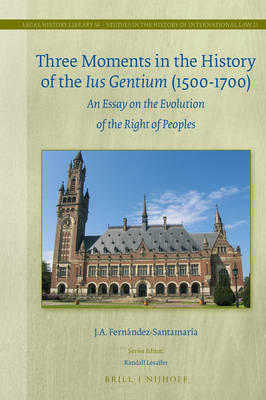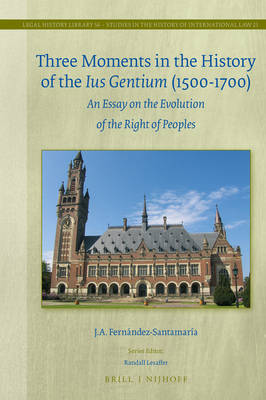
- Afhalen na 1 uur in een winkel met voorraad
- Gratis thuislevering in België vanaf € 30
- Ruim aanbod met 7 miljoen producten
- Afhalen na 1 uur in een winkel met voorraad
- Gratis thuislevering in België vanaf € 30
- Ruim aanbod met 7 miljoen producten
Zoeken
Three Moments in the History of the Ius Gentium (1500-1700)
An Essay on the Evolution of the Right of Peoples
J a Fernández-Santamaría
€ 199,95
+ 399 punten
Omschrijving
At the foundation of international law lies the notion of ius gentium or right of peoples, an idea that fully came into its own with the discovery of America and the effort to resolve the moral issues posed by the Spanish presence. Once Vitoria broadened the Augustinian concept of an international community by proposing the use of reason as the only criterion for membership in that community, it remained to formulate the laws needed to impose order on it. But before accomplishing that task, two questions must be accounted for: what is the nature of the ius gentium, and what is its relation to ius naturale? How theologians, philosophers, jurists sought the answers between 1500 and 1700 is the subject of this essay.
Specificaties
Betrokkenen
- Auteur(s):
- Uitgeverij:
Inhoud
- Aantal bladzijden:
- 260
- Taal:
- Engels
- Reeks:
- Reeksnummer:
- nr. 56
Eigenschappen
- Productcode (EAN):
- 9789004506206
- Verschijningsdatum:
- 27/01/2022
- Uitvoering:
- Hardcover
- Formaat:
- Genaaid
- Afmetingen:
- 157 mm x 239 mm
- Gewicht:
- 439 g

Alleen bij Standaard Boekhandel
+ 399 punten op je klantenkaart van Standaard Boekhandel
Beoordelingen
We publiceren alleen reviews die voldoen aan de voorwaarden voor reviews. Bekijk onze voorwaarden voor reviews.








